One of the biggest collections of Roman coins ever discovered in Britain was discovered by an amateur metal detectorist.
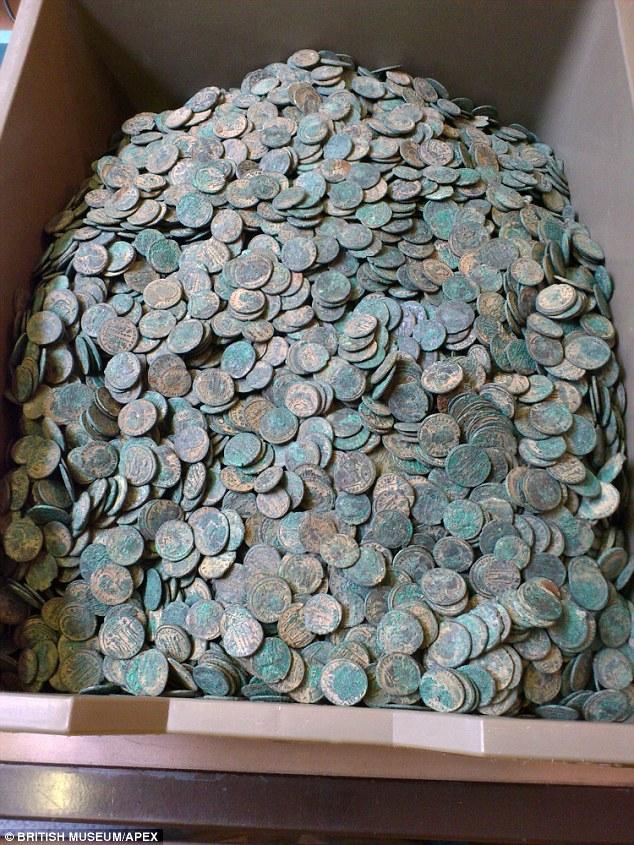
Laurence Egerton, 51, made the discovery as he explored land near Seaton, in East Devon – and he was so concerned someone would steal it, he camped out for three nights while archaeologists excavated the site.
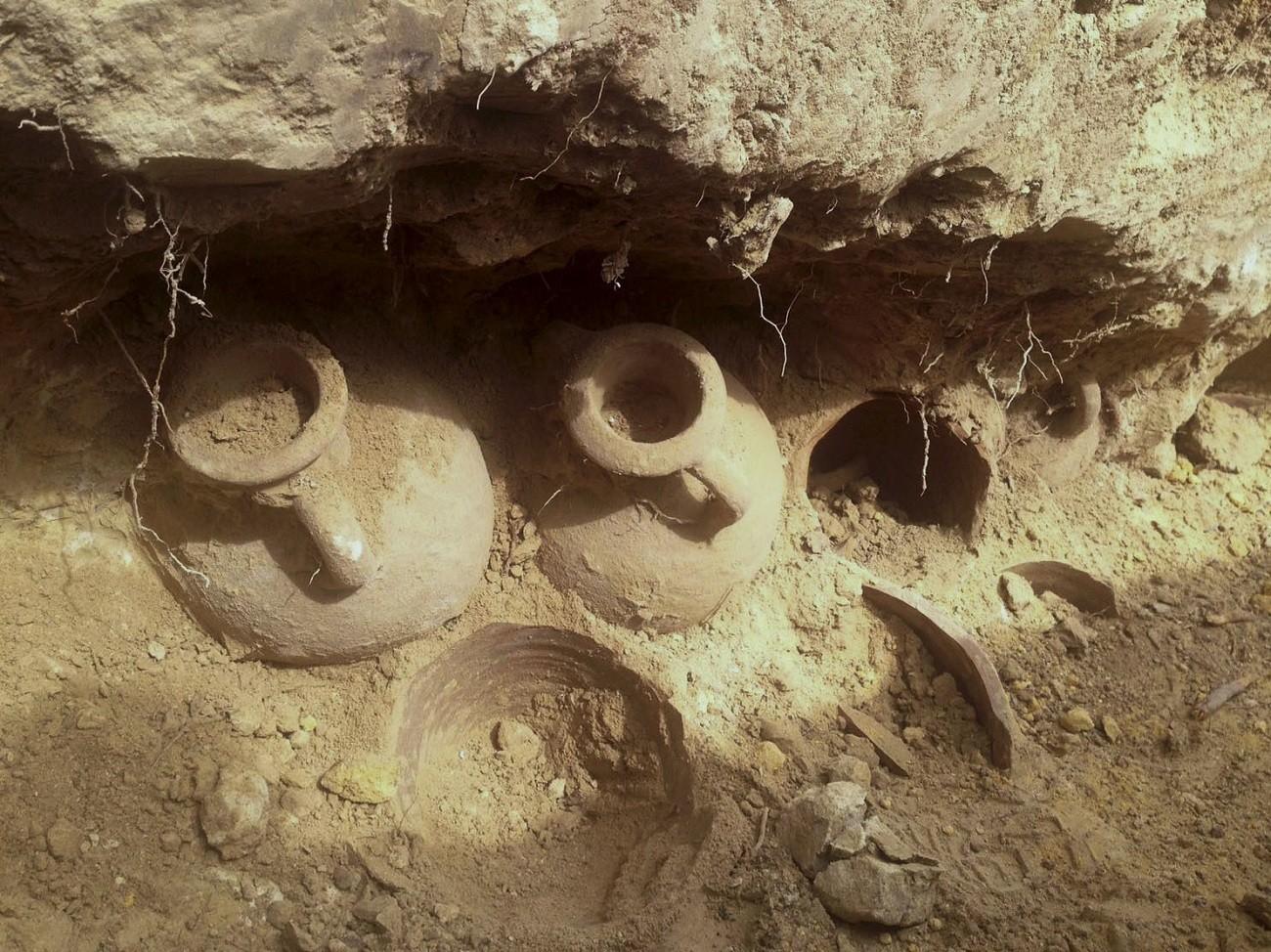
Dubbed Seaton Down Hoard, the collection of 22,000 copper-alloy coins is thought to have been buried by a private individual or soldier for safekeeping, but was never recovered.
Scrolled down for video.
The trove of 22,000 Roman coins (pictured) was found by Laurence Egerton in East Devon. Dubbed Seaton Down Hoard, it was declared treasure at a Devon Coroner’s Inquest earlier this month. This means it is eligible for acquisition by a museum, once it has been valued by the Treasure Valuation Committee.
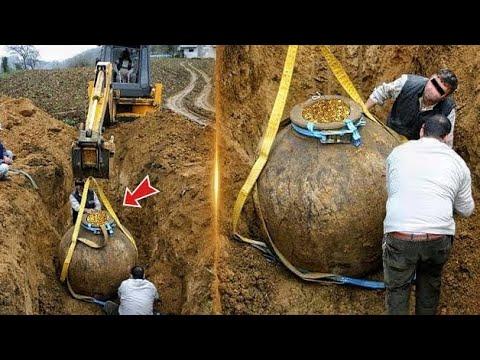
In addition to being one of the largest hoards – behind the Frome Hoard of 52,503 found in 2010, and a hoard of 22,703 found in North Cornwall in 1989 – Mr. Egerton’s discovery is also one of the best-preserved 4th-century collections to be dug up.
Earlier this month, Mr. Egerton’s hoard was declared treasure at a Devon Coroner’s Inquest.
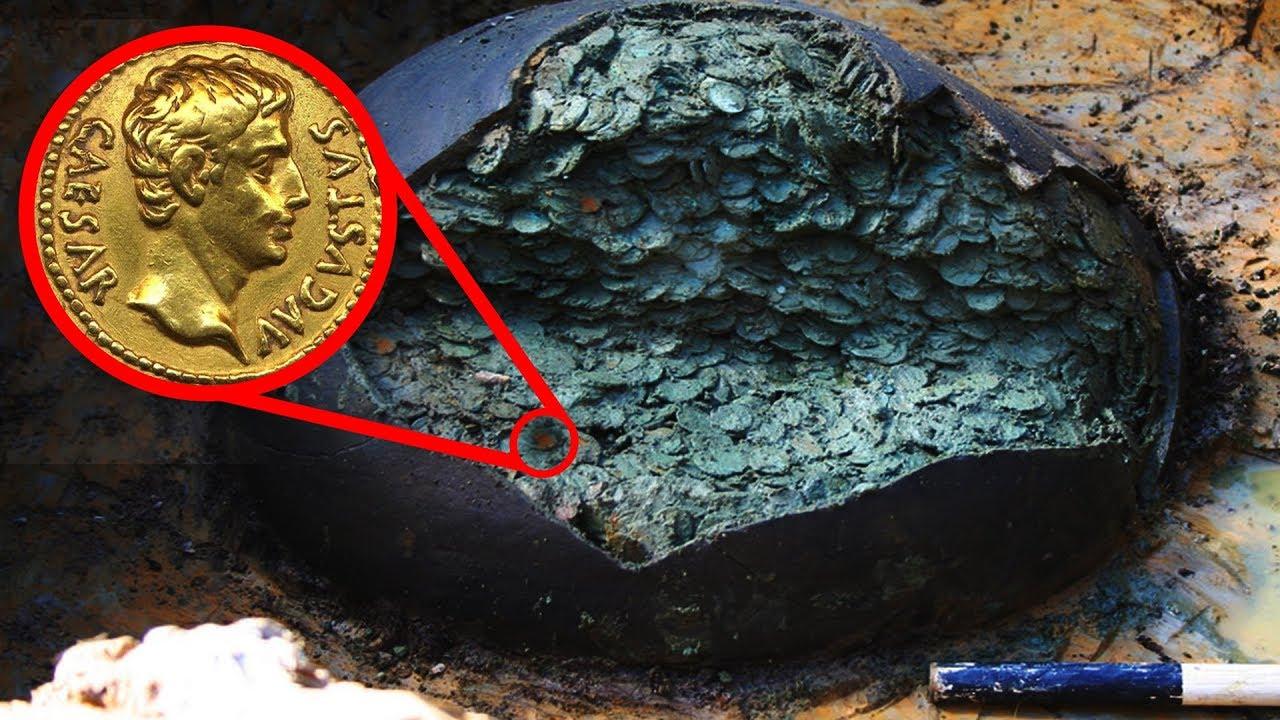
This means it is eligible for acquisition by a museum, once it has been valued by the Treasure Valuation Committee – a group of independent experts who advise the Secretary of State.
By comparison, the Frome Hoard was valued at £320,000 – so, in theory, the collection could cost in the region of £100,000.
However, the Frome Hoard contained a mixture of silver and copper, so was considered more valuable.
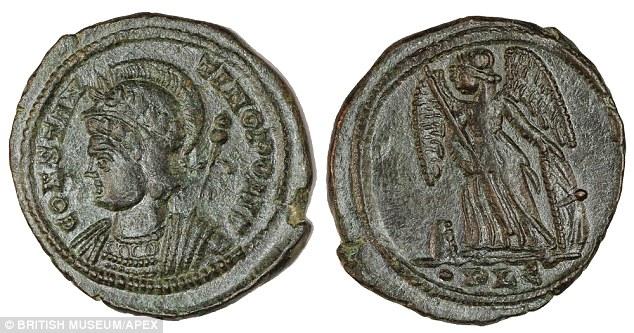
At the time the hoard was buried, it would have amounted to four gold coins, or sovereigns, which would have provided the rate of two salaries for one year, or a worker’s pay for two years.
Professor Neville Morley from Bristol University told MailOnline: “Our knowledge of ancient prices is very patchy indeed, and the purchasing power of money varied enormously over time and space.”
The amount of money in this hoard would at some points have been the equivalent to a soldier’s total salary for two years; at other dates, it would have bought the services of a skilled craftsmen for perhaps 80 days; it could buy maybe 1,000 or so pints of Gallic beer (or double quantities of Egyptian beer, which wasn’t so good) or enough grain to feed someone for two years or so.
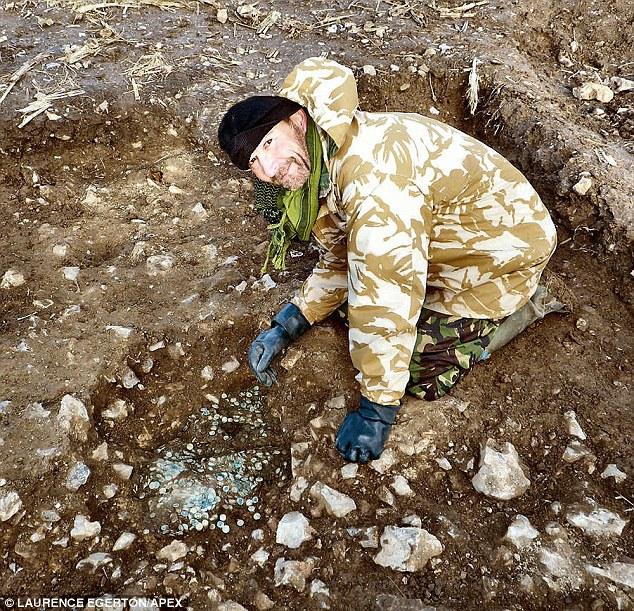
‘If you try to turn any of these into modern figures, then, it’s pretty moot the sort of fortune that would allow you to retire comfortably or buy a nice country estate; on the other hand, in a world where most people were living close to subsistence level and would have to give much of their income to landlords or buy a nice gravestone, it’s pretty impressive that someone had amassed enough money to live on for a year or so.’
The Royal Albert Memorial Museum (RAMM) in Exeter, which already houses a large collection of local Romano-British objects, has launched a fundraising campaign to purchase the coins.
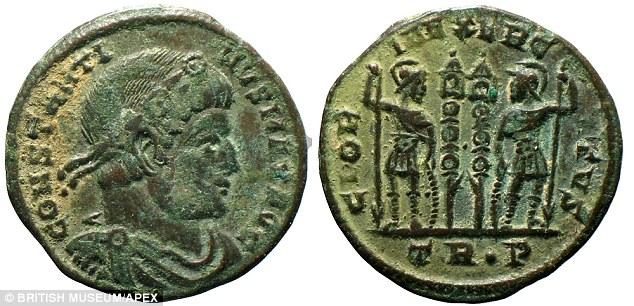
Mr. Egerton originally made the discovery in November 2013, while operating under license on private land near the preemptively excavated site of a Roman villa at Honeyditches in East Devon. The coins were buried in a pot and may have been deliberately concealed by experts at the British Museum.
According to Devon County Archaeologist, Bill Horner, the Roman copper-alloy coins (unearthed) date back to between AD 260 and AD 348 and bear the images of Emperor Constantine, his family, co-Emperors, and immediate predecessors.
It was also reported to Landowner Clinton Devon Estates, in accordance with the Treasure Act 1996.
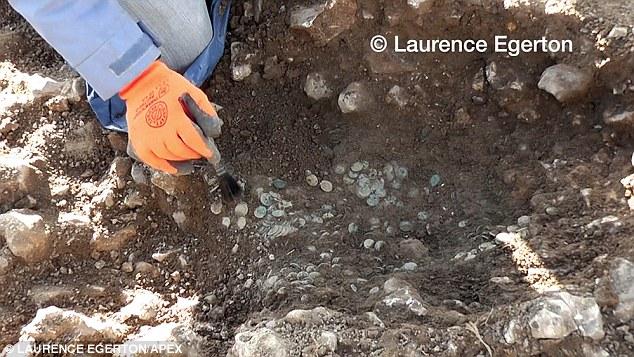
Mr. Egerton said: ‘It’s by far the biggest find I’ve ever had. It really doesn’t get any better than this.
‘Between finding the hoard and the archaeologists excavating the site, I slept in my car alongside it for three nights to guard it.
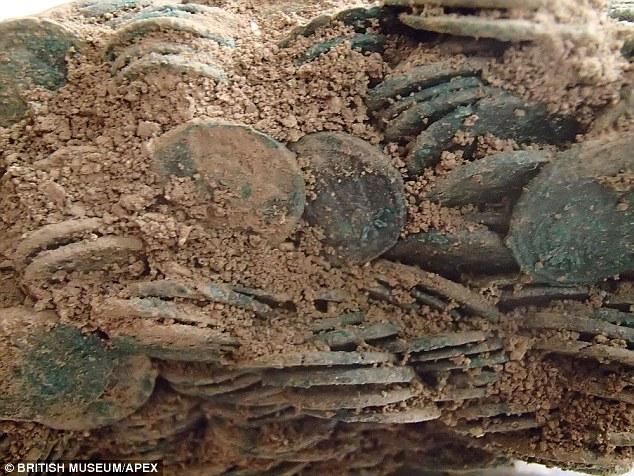
‘On this occasion, the ground where I was working was quite flinty and I found what I thought were two Roman coins which is actually quite usual in Devon.
‘As I began working in a grid formation in the surrounding area I had a signal on the metal detector which means that there is probably iron involved.
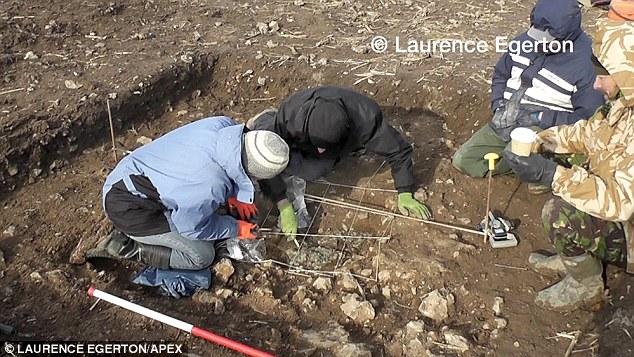
‘Most detectors are set up to ignore iron but I decided to dig at that spot and immediately reached some iron ingots which were laid directly on top of the coins.
‘Most detectors are set up to ignore iron but I decided to dig at that spot and immediately reached some iron ingots which were laid directly on top of the coins.
Semiretired builder Mr. Egerton, 51, (pictured) originally made the discovery in November 2013. Between finding the hoard and archaeologists excavating the site, Mr. Egerton slept in his car on site to guard it.
In addition to being one of the largest hoards in Britain – behind the Frome Hoard of 52,503 found in 2010, and a hoard of 22,703 found in North Somerset in 1989 – Mr. Egerton’s discovery is also one of the best-preserved 4th-century coin collections (pictured).
Mr. Horner said: ‘Our archaeologists and the team at the British Museum have reported that the majority of the coins are so well preserved that they were able to determine that they were able to date them very accurately.
‘This is very unusual for Devon because the county has slightly acidic soil which leads to metals corroding.
The discovery was made while Mr. Egerton was operating under license on private land near the previously excavated site of a Roman villa at Honeyditches in East Devon (pictured). It was reported to landowner Clinton Devon Estates, in accordance with the Treasure Act 1996.
Exeter’s Royal Albert Memorial Museum (RAMM) has said it would love to keep the hoard (unearthed buried uncovered) in Devon so that it can be seen by the public for the first time in over 1,500 years.
Mr. Horner explained: ‘There were no banks, so a good, deep hole in the ground was as secure as any to hide your savings in times of trouble, or if you were going away on a long journey.
‘But whoever made this particular deposit never came back to retrieve it.’
Exeter’s RAMM has said it would love to keep the hoard in Devon so that it can be seen by the public for the first time in over 1,500 years.
The hoard (unearthed buried uncovered) was excavated by a team of archaeologists and were cleaned so they could be identified by experts at the British Museum. The find is said to be very unusual for the region because the county has slightly acidic soil, which tends to corrode metals over time.
Archaeologists excavated the site in Seaton. Other significant discoveries of Roman coin hoards in the Southwest include the Frome Hoard in Somerset – the largest ever Roman coin hoard found in a single vessel, consisting of 52,503 coins deposited around 290 AD.
The museum hopes to be able to raise the funds and is organizing a fundraising campaign.
Other significant discoveries of Roman coin hoards in the Southwest include the Frome Hoard in Somerset – the largest ever Roman coin hoard found in a single vessel, consisting of 52,503 coins deposited around 290 AD.
In 1989, 22,703 coins were found in North Compton in Dorset, but this was before the Treasure Act came into force, so the collection was never reported.
[embedded content]





